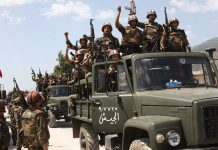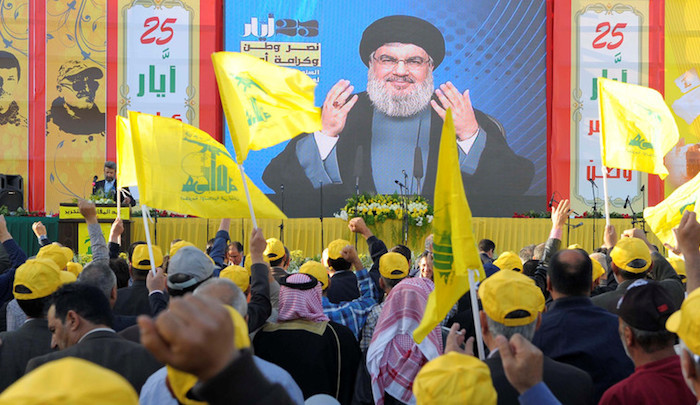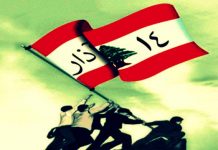حزب الله” متورط بجرائم غسيل أموال ومخدرات في أميركا
العربية. نت/13 تشرين الأول/16
كشفت وسائل إعلام أميركية عن اعتقال عنصرين من ميليشيات “حزب الله” اللبناني في أميركا وفرنسا وملاحقة زميل ثالث لهم، بجرائم غسيل أموال والإتجار بالمخدرات في الولايات المتحدة. ووفقا لصحيفة ” ميامي هيرالد”، فإن هولاء العناصر من “حزب الله” تورطوا مع ثلاث شركات كبرى في كولومبيا في غسيل أموال، والإتجار في المخدرات عن طريق بنوك في ميامي جنوب فلوريدا. وتقول الصحيفة إن هذه القضية كشفت عن التعاون المتزايد بين جماعات الجريمة المنظمة في أميركا اللاتينية، والجماعات الإرهابية في منطقة الشرق الأوسط.
إعتقال المتهم الرئيسي في القضية
وبحسب التقرير، فإن المتهم الرئيسي في قضية غسيل الأموال هو محمد أحمد عمار ( 32 عاما)، والذي كان يعيش في ولاية كولومبيا وقد تم إتهامه، في حين تم إعتقال مشتبه به آخر في فرنسا، والمتهم الثالث لا يزال على قوائم الملاحقة القانونية. واعتقل عمار ضمن تحقيق لإدارة مكافحة المخدرات في عمليات الكوكايين الكولومبي، مع العشرات من المشتبه بهم في الإتجار غير المشروع في المخدرات وغسل الأموال. ويعتقد أن عمار كان يعمل ضمن شبكة مع تجار من كولومبيا عبر هولندا واسبانيا والمملكة المتحدة وأستراليا وأفريقيا. أما المتهمان الآخران اللذان ينتميان لميليشيات “حزب الله” هما حسن محسن منصور، ويحمل الجنسية اللبنانية والكندية المزدوجة وهو قيد الإحتجاز في باريس ويواجه اتهامات مماثلة في جنوب فلوريدا، وغسان دياب وهو قيادي في “حزب الله” و لديه حق الوصول إلى العديد من الحسابات المصرفية الدولية”، والهارب حالياً ويعتقد أنه إما في لبنان أو نيجيريا، وفقا لصحيفة “ميامي هيرالد”.
ثروة “حزب الله” من المخدرات
ويذكر أن عضوا بارزا في لجنة المال بمجلس النواب الأميركي كان قد كشف أن 30 %من مداخيل “حزب الله” في لبنان هي من عائدات تهريب وتصنيع وبيع المخدرات. وبحسب النائب الأميركي تقوم مجموعات منظمة حكومياً من أجهزة أمنية إيرانية، بتأمين نقلها إلى لبنان جواً أو بحراً أو براً وتسليمها إلى شعبة أمنية خاصة من مسؤولين في الحزب، ليتم تهريبها إلى أوروبا وإفريقيا والولايات المتحدة عبر أميركا اللاتينية والمكسيك. وفي حزيران الماضي، كشفت صحيفة “واشنطن تايمز” الأميركية، قيام “حزب الله” اللبناني بنقل كميات كبيرة من “الكوكايين” من أميركا الجنوبية إلى أوروبا، بهدف تمويل عملياته ومخططاته.ونقلت الصحيفة عن قائد عمليات مكافحة المخدرات السابق مايكل براون، قوله إن مخططات عمليات نقل الأموال التي يقوم بها “حزب الله” باتت أكثر تطوراً من أي وقت مضى. وفي شباط الماضي، أعلنت وكالة مكافحة المخدرات الأميركية عن اعتقال عناصر من “حزب الله” اللبناني بتهمة العمل مع كارتل المخدرات الدولي الموجود في كولومبيا لتهريب المخدرات إلى أوروبا وغسل أموال عن طريق لبنان، حيث جاءت هذه الإعتقالات على خلفية تزايد المخاوف في واشنطن، حول تهريب الأموال والمخدرات بين الجماعات الإرهابية حول العالم.
Miami: Three Hizballah operatives busted for laundering $500,000 of cocaine money for Colombian cartel
Robert Spencer/Jihad Watch/October 13/2016/Hizballah is a wholly owned and operated subsidiary of the Islamic Republic of Iran. Iran has repeatedly declared its intention to destroy the United States, as you can read about in detail in my book The Complete Infidel’s Guide to Iran (Regnery). Hizballah working with the drug cartel kills two birds with one stone: drugs weaken and destroy Americans, and sap American resources in largely futile anti-drug efforts, and the cash Hizballah earns in working with the drug cartel goes for more jihad against the U.S.
“State: Hezbollah-linked group laundered drug money through Miami banks,”
David Ovalle, Miami Herald, October 11, 2016
Three men suspected of laundering cocaine money for the Colombian cartel have been busted after agents say they illegally moved $500,000 into Miami banks through a series of complicated financial transactions stretching from Australia to Europe.
That’s not uncommon in Miami, but the trio’s background is: They are suspected associates of the Middle Eastern terror group Hezbollah.
The main player is Mohammad Ahmad Ammar, 31, who was living in Medellín, Colombia. He was quietly booked into a Miami-Dade jail last week to face state felony money laundering charges in a case that underscores increased law-enforcement scrutiny on the role of Middle Eastern terror groups who use financial networks in Latin America to earn untold millions off drug profits.
Along with Ammar, two other Hezbollah associates are facing charges charges in the same case. One of them is in custody in Paris, while the other is on the lam, possibly in Lebanon or Nigeria.
The DEA investigated the case along with the the South Florida Money-Laundering Strike Force, a group of federal and state investigators that recently helped bust 22 people suspected in a large run connected to Mexican kingpin Joaquín “El Chapo” Guzmán.
“Drug dealers, potential terrorists and money launderers should all get the message that Miami-Dade County is not the place to do your dirty business,” Miami-Dade State Attorney Katherine Fernandez Rundle said in a statement.
The involvement of radical Islamic terrorist groups in Latin American is not new but has increased in recent years, according to federal law enforcement and security experts.
In November 2012, a congressional report on border security noted that Latin America has “become a money laundering and major fundraising center” for Hezbollah, the Shiite Muslim group classified as a terrorist organization by the U.S. government. The group, based in Lebanon, has been a key ally of Syrian dictator Bashar Assad in the bloody war that has decimated the country for the past five years.
“The notion of terrorist groups, especially Islamists using Latin America as place for money laundering, drug trafficking and other nefarious trades — it’s been known for some time now,” Jerry Haar, a Latin America expert at Florida International University, said in an interview.
In February, the U.S. Drug Enforcement Administration announced a “significant enforcement activity” against people connected with Hezbollah, The DEA’s efforts in “Operation Cassandra” came after the U.S. Department of Treasury announced sanctions against Hezbollah’s financiers, whom they the believe are capable of earning $400 million a year from drug trafficking and money laundering.
Exactly how much of money generated from laundering drug money is used directly to fund terror attacks is unknown. Many of those business associates such as Ammar “are more concerned with generating cash than religious or political doctrine” — though they readily send money back to their handlers in the Middle East, according to an arrest warrant.
Hezbollah-related arrests stemming from Latin American have popped up before in South Florida.
In 2008, a Lebanese man named Chekri Harb was arrested and convicted as part of a large-scale Colombian cocaine ring. U.S. authorities did not name Hezbollah in charging documents, but Colombian security officials described him as having links to the group.
Federal agents in 2010 arrested three South Florida businessmen accused of exporting video games and other electronic products to a shopping mall in Paraguay that allegedly served as a front to Hezbollah. They wound up being convicted of non-terrorism-related charges.
The lawless area at the borders of Paraguay, Brazil and Argentina has long been identified by the U.S. as a hotspot for money launderers who send their money back to the Middle East.
The latest Miami case was a spinoff from the DEA investigation into Colombian cocaine operations that netted dozens of trafficking and money-laundering arrests. In custody in Miami is Ammar, described in court documents as a Hezbollah associate whose job was to launder money for the Colombian cocaine operation known as La Oficina, or The Office, an off-shoot of the notorious Medellín cartel.
He was known to launder money through Holland, Spain, the United Kingdom, Australia and Africa, according to an arrest warrant. Ammar is charged with eight felonies, including money laundering and conspiracy to launder money; court records do not list a defense attorney.
According to court documents, his father is a well-connected Hezbollah associate living in Los Angeles, where the younger Ammar was arrested last month.
Also facing charges is Ghassan Diab, another purported Hezbollah associate based in Nigeria. According to court documents, Diab is related to a “high-ranking member of Hezbollah who has access to numerous international bank accounts.” He remains on the loose, possibly in Nigeria or Lebanon.
The third man facing charges is Hassan Mohsen Mansour, another Hezbollah associate with dual Lebanese and Canadian citizenship. He is in custody in Paris, and is facing a separate but similar federal money-laundering prosecution in South Florida.
The 42-page arrest warrant reads like a plot out of a international spy thriller, detailing a complicated web of encrypted communications between players in far-flung countries — some of them secretly working as informants — and murky financial transactions on six different continents.
A confidential source first tipped of Miami DEA agents to Ammar in early 2014, introducing him a second confidential informant who secretly recorded their meetings.
The second informant eventually asked Ammar to help him launder $250,000 worth of Australian dollars that was netted from cocaine sales. The task: Move the money to banks in Miami, where it could be moved later to Colombia or used by Colombian traffickers in South Florida.
Ammar was not aware, however, that the money was actually DEA cash and the Miami accounts were set up by the feds.
Using encrypted communications, Ammar enlisted the help of Mansour in Paris, who contacted a source in Australia (who by coincidence, happened to be an informant for the police there) to pick up the cash.
The money was deposited into an account in Dubai in the United Arab Emirates — where the anything-goes banking system remains out of reach of U.S. authorities. It was then then broken up and moved through a sham company called Al Haitham Exhibition and Conference Organizers, which purports to organize events but authorities believe is simply a front for money laundering.
From there, the money was cashed out and disappeared, according to an arrest warrant by DEA agent Kenneth Martin and state prosecutor Jared Nixon.
Back in Miami, the bank accounts set up by the DEA soon began receiving the money in chunks from obscure companies with names like “Tropical Trading” and “Khofo International.” To make them look like legitimate business, phony invoices were sent by Diab for nebulous goods or “payment for shipment.”
After the first deal went through successfully, Ammar soon admitted to the DEA informant that he was working with La Oficina, the chief cartel in Medellin, the warrant said.
In September 2014, another deal to launder $250,000 was struck. The Australian cash was sent to the events company in Dubai, with a note that it was for the purchase of a four-carat diamond ring head for Majorca, Spain. Through more bogus companies, some of the money was eventually transferred into the DEA’s Miami bank accounts; one transaction was disguised as payment for 50-kilogram bags of white rice.
Throughout the undercover operation, Ammar made admissions of interest to investigators, according to the warrant, including that he knew two brothers who worked for Avianca airlines who could smuggle in cocaine to Miami.
He also boasted that his family was well connected with Hezbollah, and inquired if the informant would be interested in helping smuggle 150 kilograms of cocaine from Costa Rica to the Netherlands.






















